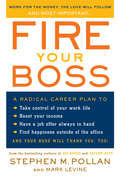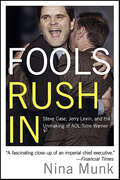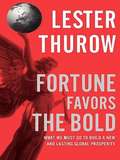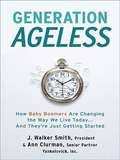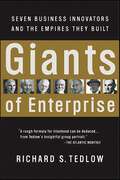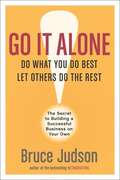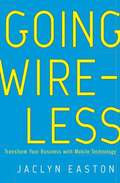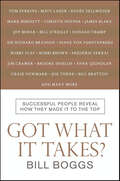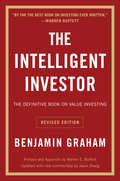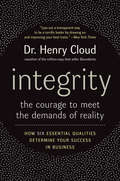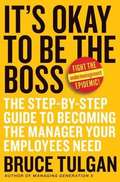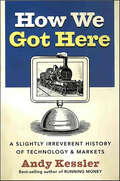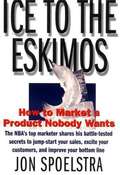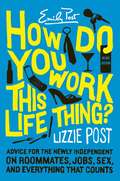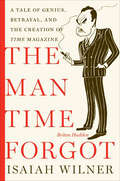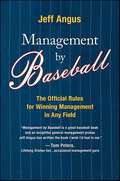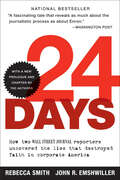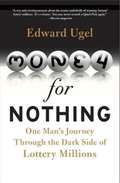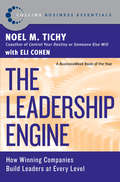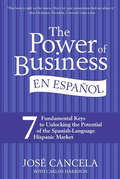- Table View
- List View
Deflation
by Chris FarrellDeflation is one of the most feared terms in economics. It immediately conjures visions of abandoned farms and idle factories, streams of unemployed workers standing in breadlines. So when Federal Reserve Board Chairman Alan Greenspan started talking openly in 2003 about his fears of deflation, it sent waves of shock through the business press and the public. Many feared that the United States was entering a period of prolonged slump after a pronounced boom, much like Japan experienced throughout the 1990s. Others worried that a sustained fall in prices would have a cataclysmic impact on our nation's overhang of consumer debt. Yet another camp blamed low-wage manufacturing countries like China and high-volume retailers like Wal-Mart for becoming the engines of relentless deflation. In this important new book, Chris Farrell explains that deflation need not presage a collapse. In the process he gives a new way of looking at our economic and our financial futures. More than an introduction to the subject, Farrell points out that deflation has always been a fundamental aspect of the business cycle. For much of the 20th century, deflation had vanished from the economic scene, but its return is no cause for panic. Instead, properly understood, deflation presents opportunities and pitfalls in equal measure for businesses, corporations, the government, and our national economy.
Digital Hustlers: Living Large and Falling Hard in Silicon Alley
by Casey Kait Stephen WeissThe commercial and cultural explosion of the digital age may have been born in California's Silicon Valley, but it reached its high point of riotous, chaotic exuberance in New York City from 1995 to 2000--in the golden age of Silicon Alley. In that short stretch of time a generation of talented, untested twentysomethings deluged the city, launching thousands of new Internet ventures and attracting billions of dollars in investment capital. Many of these young entrepreneurs were entranced by the infinite promise of the new media; others seemed more captivated by the promise of infinite profits. The innovations they launched--from online advertising to 24-hour Webcasting--propelled both the Internet and the tech-stock boom of the late '90s. And in doing so they sent the city around them into a maelstrom of brainstorming, code-writing, fundraising, drugs, sex, and frenzied hype ... until April 2000, when the NASDAQ zeppelin finally burst and fell at their feet. In the pages of Digital Hustlers, Alley insiders Casey Kait and Stephen Weiss have captured the excitement and excesses of this remarkable moment in time. Weaving together the voices of more than fifty of the industry's leading characters, this extraordinary oral history offers a ground-zero look at the birth of a new medium. Here are entrepreneurs like Kevin O'Connor of DoubleClick, Fernando Espuelas of StarMedia, and Craig Kanarick of Razorfish; commentators like Omar Wasow of MSNBC and Jason McCabe Calacanis of the Silicon Alley Reporter; and inimitable Alley characters like party diva Courtney Pulitzer and Josh Harris, the clown prince of Pseudo.com. Together they describe a world of sweatshop programmers and paper millionaires, of cocktail-napkin business plans and billion-dollar IPOs, of spectacular successes and flame-outs alike. Candid and open-eyed, bristling with energy and argument, Digital Hustlers is an unforgettable group portrait of a wildly creative culture caught in the headlights of achievement.
Fire Your Boss
by Stephen M. Pollan Mark LevineFire Your Boss And Hire Yourself. Impossible? Not according to nationally bestselling author Stephen M. Pollan. As he says in this new and empowering book, "You don't have to accept your current work situation. You can be in control of your job and your stream of income, so you're never again subject to the whims, prejudices, moods, or circumstances of your so-called boss." In today's difficult work environment, gone are the days of finding satisfaction through your job, gone is the time when your job was secure, and gone are the days when your employer cared about you. This new environment requires new rules, and Pollan has provided surprisingly fresh and intriguing methods for finding "success" on the job. Pollan's bold and unique message begins with the idea that you must "fire your boss." By this he means you can no longer rely on your manager or your company for economic security. Instead, you must put yourself in charge of your working life. In this thought-provoking and counterintuitive career guide, Pollan presents a seven-step program and a series of exercises that give you the confidence, power, and will to achieve the life of your dreams. Once you have changed your mind-set and learned the new rules of the game, you can start the process of moving to a richer, more enriching, and more enjoyable life. And the best part about it? Your boss will love you for it.
Fools Rush In: Steve Case, Jerry Levin, and the Unmaking of AOL Time Warner
by Nina MunkEvery era has its merger; every era has its story. For the New Media age it was an even bigger disaster: the AOL-Time Warner deal. At the time AOL and Time Warner were considered a matchless combination of old media content and new media distribution. But very soon after the deal was announced things started to go bad—and then from bad to worse. Less than four years after the deal was announced, every significant figure in the deal -save the politically astute Richard Parsons—has left the company, along with scores of others. Nearly a $100 billion was written off and a stock that once traded at $100 now trades near $10.What happened? Where did it all go wrong? In this deeply sourced and deftly written book, Nina Munk gives us a window into the minds of two of the oddest men to ever run billion-dollar empires. Steve Case, the boy wonder who built AOL one free floppy disk at a time, was searching for a way out of the New Economy. Meanwhile Jerry Levin, who'd made his reputation as a visionary when he put HBO on satellite distribution, was searching for a monumental deal. These two men, more interested in their place in history than their personal fortunes, each thought they were out-smarting the other.
Fortune Favors the Bold
by Lester C. ThurowBestselling author and renowned economist Lester Thurow argues forcefully that globalization is not a done deal and we must seize the moment now if we are to create a new global economy in which all can prosper. In this new book, Thurow examines the newly-forming global economy, with a special focus on the role of the US and the dangers to our own national well-being. He examines such questions as: What's at stake for us in the global economy? Why is it important that the system be equitable and that other countries prosper along with us? What should our goals as a nation be - long term and short term? What are the tough choices that need to be made in our relationship with other countries and world regulatory bodies? What role should we be playing globally? What are the political, economic, social choices / tradeoffs we will have to confront? Thurow contends that the huge and growing US trade deficit poses grave dangers to the value of the dollar and is putting our own economy in jeopardy. As the world economy leaps national boundaries, its hallmark seems to be a rising instability and a growing inequality between the first and third worlds. Financial crises in the third world come ever more frequently and seem to be ever more severe. The first world economies seem to be in ever more frantic boom and bust cycles. Globalization causes riots throughout the world and is one factor in the rise of terrorism against the West. Thurow shows how some nations, including Ireland and China, have embraced the concept of globalization and placed themselves into a position to prosper with growing and productive national economies. He contrasts their positive actions with Japan, whose leaders have allowed the nation to drift into stagnation and have destroyed its prosperity. He argues that this is the time to choose globalization or be left behind, the time to "build a global economy that eliminates the defects," and he provides plenty of ideas for corporations, governments, economists, and citizens to act upon.
Generation Ageless
by J. Walker Smith Ann ClurmanGeneration Ageless--an authoritative and eye-opening look at the past, present, and future of Baby Boomers Think Baby Boomers are all alike? Think again. This dynamic generation is nearing the traditional age of retirement, but is in no mood to slow down. Learn how to market, sell to, do business with, or just understand this remarkable generation, from Yankelovich, Inc., the organization that knows them better than anyone else. Yankelovich actually coined the term "Baby Boomer" back in the late 1960s, when they first started collecting data on this influential generation. Now, more than thirty years later, they have the most complete information on Boomers ever assembled. And they have put it all together in this groundbreaking look at America's largest and most powerful generation. In Generation Ageless, Yankelovich president J. Walker Smith, Ph.D., and senior partner Ann Clurman, Boomers themselves, dig deep into what makes this generation tick. With fresh, original data and a wide-ranging look at everything about Boomers, they dissect Boomers into six major segments--Straight Arrows, Due Diligents, Maximizers, Sideliners, Diss/Contenteds, and Re-Activists--to provide new insights into the world's most talked-about generation. The results show key imperatives invaluable to anyone selling a product, service, or idea to this 78-million strong group. Boomers are the dominant generation in America. Their values and aspirations set the tone for everyone. Advances in medicine and health mean that this youth-obsessed generation is now focused on an everlasting prime of life. They are literally middle age-less: holding onto their position at the top of the pyramid for as long as possible, and not fading away to their golden years. Today's fifty- and sixty-year-old Boomers are not eagerly anticipating lives of disengaged retirement. Instead, middle age-less Boomers expect another twenty or thirty years of impact and influence--albeit in a variety of ways reflective of a surfeit of agendas and ambitions they have yet to fulfill.
Giants of Enterprise: Seven Business Innovators and the Empires They Built
by Richard S. TedlowSeven business innovators and the empires they built. The pre-eminent business historian of our time, Richard S. Tedlow, examines seven great CEOs who successfully managed cutting-edge technology and formed enduring corporate empires. With the depth and clarity of a master, Tedlow illuminates the minds, lives and strategies behind the legendary successes of our times: . George Eastman and his invention of the Kodak camera; . Thomas Watson of IBM; . Henry Ford and his automobile; . Charles Revson and his use of television advertising to drive massive sales for Revlon; . Robert N. Noyce, co-inventor of the integrated circuit and founder of Intel; . Andrew Carnegie and his steel empire; . Sam Walton and his unprecedented retail machine, Wal-Mart.
Go It Alone!
by Bruce JudsonThere is an epidemic of unhappiness in the American workplace. A full 70 percent of workers in the United States report that they are disengaged from their jobs. When asked, "Do you have the opportunity to do what you do best every day?" only 20 percent of nearly 2 million employees said yes. It is no wonder that 56 percent of all Americans dream of starting their own business. So why don't they do so? Because starting one's own business is seen as difficult, expensive, and risky. In this extraordinary book, successful Go It Alone! entrepreneur Bruce Judson explains that the conventional wisdom about starting your own business is stunningly wrong. Using the leverage of technology -- e-mail, the World Wide Web, and the remarkable array of off-the-shelf business services now available -- it is dramatically easier to start your own business. Magnified by these new services, it is also possible to create, for the first time, a highly focused business. Bruce Judson shows you the practical steps that will allow nearly any individual to create a business, often using job skills that seem to require an entire corporation for support. It is no longer necessary to spend time on the tasks that don't add value. It is now possible to stay small but reap big profits. Go-it-alone businesses allow the individual the freedom to concentrate on their greatest skills. After reading this book, your motto will be "Do What You Do Best, Let Others Do the Rest."
Going Wireless
by Jaclyn EastonGoing Wireless delivers the unexpected by showing how wireless is transforming every type of enterprise from micro-businesses to multi-national conglomerates.Award-winning technology journalist Jaclyn Easton begins with an in-depth look at owning your customers and clients through mobile commerce-whether your company focuses on consumers or business-to-business.From there you will learn about the advantages of wirelessly fortifying your mobile workforce of itinerant executives, sales personnel, and field service technicians as well as how wireless is dramatically redefining customer service, marketing, and advertising.Going Wireless also delves deep inside the corporation. First you'll find out why most companies are "handsizing" in addition to deploying wireless technology to rejuvenate warehouses, supply chains, procurement procedures, data collection, competitive intelligence, and much more.The best part is that these scenarios are supported by over 40 brand-name success stories, including:How Sears saves millions by wirelessly enabling 100 percent of their appliance repair technicians;How the Gap proved that by sewing wireless technology in their clothing they could reduce labor distribution costs by 50 percent;How McKessanHBOC-a Fortune 40 corporation-used mobile technology to entirely eliminate all their manifest imaging costs.While most people associate wireless with cell phones and Palm handhelds, you'll also learn that wireless has been around for over 100 years and has spawned mobile options you've never heard of and is being used in ways you've never imagined.This makes Going Wireless the perfect book for executives and managers who need a comprehensive overview of the wireless options that can make their companies more competitive, more productive, and more profitable.
Got What It Takes?: Successful People Reveal How They Made It to the Top
by Bill BoggsBeyond talent, what factors have determined and defined the careers of well-known individuals? Training? Risk-taking? Luck? Emmy Award®-winning interviewer Bill Boggs shares success secrets he uncovered in candid conversations with 44 leaders in entertainment and the arts, sports, fashion, the business world, and more, including: Mark Burnett, Craig Newmark (Craigslist.com), Matt Lauer, Anna Quindlen, Renée Zellweger, Sir Richard Branson, Bobby Flay, Brooke Shields, Diane von Furstenberg, Norman Lear, Donald Trump, and Joe Torre, among others. They reveal crucial influences, how they deal with adversity and stress, and the choices they made that helped them to prevail in their careers and in their lives. This is an inside view of what makes the most successful people tick and a lessons-in-life career guide from accomplished stars at the top of their game.
The Intelligent Investor (Revised Edition): The Definitive Book On Value Investing
by Benjamin Graham<p>The greatest investment advisor of the twentieth century, Benjamin Graham taught and inspired people worldwide. Graham's philosophy of "value investing" -- which shields investors from substantial error and teaches them to develop long-term strategies -- has made <i>The Intelligent Investor</i> the stock market bible ever since its original publication in 1949. <p>Over the years, market developments have proven the wisdom of Graham's strategies. While preserving the integrity of Graham's original text, this revised edition includes updated commentary by noted financial journalist Jason Zweig, whose perspective incorporates the realities of today's market, draws parallels between Graham's examples and today's financial headlines, and gives readers a more thorough understanding of how to apply Graham's principles. <p>Vital and indispensable, <i>The Intelligent Investor</i> is the most important book you will ever read on how to reach your financial goals.
Integrity: The Courage to Face the Demands of Reality
by Henry CloudIntegrity--more than simple honesty, it's the key to success. A person with integrity has the ability to pull everything together, to make it all happen no matter how challenging the circumstances. Drawing on experiences from his work, Dr. Henry Cloud, a clinical psychologist, leadership coach, corporate consultant and nationally syndicated radio host, shows how our character can keep us from achieving all we want to (or could) be. In Integrity, Dr. Cloud explores the six qualities of character that define integrity, and how people with integrity: Are able to connect with others and build trust Are oriented toward reality Finish well Embrace the negative Are oriented toward increase Have an understanding of the transcendent Integrity is not something that you either have or don't, but instead is an exciting growth path that all of us can engage in and enjoy.
Integrity
by Henry CloudIntegrity--more than simple honesty, it's the key to success. A person with integrity has the ability to pull everything together, to make it all happen no matter how challenging the circumstances. Drawing on experiences from his work, Dr. Henry Cloud, a clinical psychologist, leadership coach, corporate consultant and nationally syndicated radio host, shows how our character can keep us from achieving all we want to (or could) be. In Integrity, Dr. Cloud explores the six qualities of character that define integrity, and how people with integrity: Are able to connect with others and build trust Are oriented toward reality Finish well Embrace the negative Are oriented toward increase Have an understanding of the transcendent Integrity is not something that you either have or don't, but instead is an exciting growth path that all of us can engage in and enjoy.
Is The American Dream Killing You?
by Paul StilesThe "market" is the collective name for every act of buying and selling we participate in. It governs our economy and our lives, determining our values, our goals, and our accomplishments. We make it—and are made by it. In Is the American Dream Killing You? Paul Stiles shows how the pressures of the market are causing undue stress in all our lives. He explains why there is so little trust in companies, why it seems harder to feel secure, and why we never seem to be able to rest anymore. In this stunningly well-researched and elegantly argued book, Stiles shows that the harried, anxious lives we lead have one common pressure—the market.
It's Okay to Be the Boss
by Bruce TulganDo you feel you don't have enough time to manage your people? Do you avoid interacting with some employees because you hate the dreaded confrontations that often follow? Do you have some great employees you really cannot afford to lose? Do you secretly wish you could be more in control but don't know where to start? Managing people is harder and more high-pressure today than ever before. There's no room for downtime, waste, or inefficiency. You have to do more with less. And employees have become high maintenance. Not only are they more likely to disagree openly and push back, but they also won't work hard for vague promises of long-term rewards. They look to you--their immediate boss--to help them get what they need and want at work. How do you tackle this huge management challenge? If you are like most managers, you take a hands-off approach. You "empower" employees by leaving them alone, unless they really need you. After all, you don't want to "micromanage" them and don't have the time to hold every employee's hand. Of course, problems always come up and often snowball into bigger problems. In fact, you probably spend too much of your time solving problems and falling behind on your work . . . which leaves even less time for managing people . . . which opens the door for even more problems! In It's Okay to Be the Boss, Bruce Tulgan puts his finger on the biggest problem in corporate America--an undermanagement epidemic affecting managers at all levels of the organization and in all industries--and offers another way. His clear, step-by-step guide to becoming the strong manager employees need challenges bosses everywhere to spell out expectations, tell employees exactly what to do and how to do it, monitor and measure performance constantly, and correct failure quickly and reward success even more quickly. Now that's how you set employees up for success and help them earn what they need. Tulgan opens our eyes to the undisciplined workplace that is overwhelming managers and frustrating workers and invites bosses everywhere to accept the sacred responsibility of managing people. His message: It's okay to be the boss. Be a great one!
How We Got Here: A Slightly Irreverent History of Technology & Markets
by Andy KesslerBest-selling author Andy Kessler ties up the loose ends from his provocative book, Running Money, with this history of breakthrough technology and the markets that funded them.Expanding on themes first raised in his tour de force, Running Money, Andy Kessler unpacks the entire history of Silicon Valley and Wall Street, from the Industrial Revolution to computers, communications, money, gold and stock markets. These stories cut (by an unscrupulous editor) from the original manuscript were intended as a primer on the ways in which new technologies develop from unprofitable curiosities to essential investments. Indeed, How We Got Here is the book Kessler wishes someone had handed him on his first day as a freshman engineering student at Cornell or on the day he started on Wall Street. This book connects the dots through history to how we got to where we are today.
Ice to the Eskimos
by Jon SpoelstraYou. That's Right. YOU. You've got a problem. You've got a product that's not first in its class. It's not even second. You've got to find a way to market that product. What Are You Going To Do? You're going to read this book, that's what. Let's face it. There comes a time in the life of every business when a product or service does not sell up to expectations. Maybe your product is outmoded. Or hasn't been positioned correctly. Or is competing in a crowded market. Whatever the reason, Ice to the Eskimos is dedicated to helping you reclaim that lost ground. It's about taking a product or service and turning it into a winner. If you've got a product that is not the best in its field, then you will love Ice to the Eskimos. Take the principles Jon Spoelstra writes about and run hard with them--you'll be amazed by the results. Written by the former president of the hapless New Jersey Nets, Jon Spoelstra is the man responsible for tripling that team's lagging revenues in just three years and increasing the season-ticket holders base by 250 percent. This guy knows what he's talking about. What everyone else had seen as a lost cause, Spoelstra saw as an outstanding opportunity to reawaken a tired and beaten product to achieve unprecedented profitability. Not just for sports marketers, this lively, entertaining book successfully makes the jump from sports to whatever your product may be. The techniques Spoelstra perfected while working for teams in the NHL and NBA--from innovative packaging to image overhaul--apply to any product in any company. The numerous winning examples are sure to make Ice to the Eskimos a must-read for anyone with a product or service to sell. Ice to the Eskimos is sure to be an instant marketing classic. It will show millions of readers how to market their product...sometimes even after they've given up hope. By using the powerful techniques in this book, you too can learn to achieve the impossible and market ice to the Eskimos.
How Do You Work This Life Thing?: Advice for the Newly Independent on Roommates, Jobs, Sex, and Everything That Counts
by Lizzie PostYou're on your own—and it's great! Except when problems crop up: roommate hassles, dating dilemmas, work stuff, social stuff, and just stuff. Finally, expert help is here. In How Do You Work This Life Thing? Lizzie Post, great-great-granddaughter of Emily Post, shows how to navigate the pleasures and perils of independent life, offering advice on everything from getting along with roommate(s) and dating to getting the job you want. Highlights include Prospective Roommate Checklist . . . Romance, Dating, and Sex at Your Place . . . The Get-It-Together Party Prep List . . . What to Wear When . . . Cell Tips: What to Do Where . . . Top Ten Table Manners . . . Dating 101 . . . Tipping 101 . . . Landing the Perfect Job Lizzie's down-to-earth style and tales from personal experience, coupled with sound advice in the Emily Post tradition, makes this a real-life guide you can trust.
The Man Time Forgot: A Tale of Genius, Betrayal, and the Creation of Time Magazine
by Isaiah WilnerAn “illuminating biography” of the forgotten, tragic genius who founded Time magazine with his friend and fierce rival Henry Luce (The New Yorker).Friends, collaborators, and childhood rivals, Briton Hadden and Henry R. Luce were not yet twenty-five when they started Time, the first newsmagazine, at the outset of the Roaring Twenties. By age thirty, they were both millionaires, having laid the foundation for a media empire. But their partnership was explosive and their competition ferocious, fueled by envy as well as love. When Hadden died at the age of thirty-one, Luce began to meticulously bury the legacy of the giant he was never able to best.In this groundbreaking, stylish, and passionate biography, Isaiah Wilner paints a fascinating portrait of Briton Hadden—genius and visionary—and presents the first full account of the birth of Time, while offering a provocative reappraisal of Henry R. Luce, arguably the most significant media figure of the twentieth century.“A riveting narrative . . . richly detailed . . . part This Side of Paradise, part Citizen Kane.” —The Wall Street Journal“[A] scintillating biography . . . a perceptive psychological study and cultural history, with a touch of ink-stained romanticism.” —Publishers Weekly“With access to the Time archives and unpublished interviews and correspondence, Wilner offers all the excitement of a new media enterprise launched in the Roaring Twenties by two fascinating figures.” —Booklist
Management by Baseball: The Official Rules for Winning Management in Any Field
by Jeff AngusWhat do Hall of Fame baseball managers like Connie Mack and John McGraw have in common with today's business leaders? Why are baseball managers like Joe Torre and Dusty Baker better role models for business, government, and non–profit management than respected corporate giants like Jack Welch and Bill Gates? And just what does Peter Drucker have to do with Oriole ex–manager Earl Weaver? Management consultant, baseball writer, and columnist for InformationWeek, Computerworld, and InfoWorld, Jeff Angus shows how anyone can become a better manager by taking lessons from the leaders and nuances of the one game that is the truest test of managerial prowess. As proven by Angus' highly popular blog, Management by Baseball is a fun, story–filled guide that gives managers and anyone in business practical, actionable, understandable tools they can use to improve performance: How do you start an organization from scratch? Take a page from baseball's 19th century origins. How do you adapt to changing markets and social conditions? Learn from the man who invented Babe Ruth. What are the simplest ways to turn around a weak department? Pick up Dick Williams' proven tactics. How do you redesign corporate strategy in response to your competitors? Learn Joe Torre's secret advantage. How do you develop emotional intelligence as a leader? Find out how Ichiro Suzuki made his transition from Japan to the Major Leagues a historic success
24 Days: How Two Wall Street Journal Reporters Uncovered the Lies that Destroyed Faith in Corporate America
by John R. Emshwiller Rebecca SmithNATIONAL BESTSELLER—with a new prologue and chapter by the authors. “A fascinating tale that reveals as much about the journalistic process as about Enron.” —The Washington PostThis is the story of Rebecca Smith and John R. Emshwiller, the two reporters who led the Wall Street Journal’s reporting on Enron and uncovered the unorthodox partnerships at the heart of the scandal through skill, luck, and relentless determination.It all started in August 2001when Emshwiller was assigned to write a supposedly simple article on the unexpected resignation of Enron CEO Jeff Skilling. During his research, Emshwiller uncovered a buried reference to an off-balance-sheet partnership called LJM. Little did he know, this was the start of a fast and furious ride through the remarkable downfall of a once highly-prized company.Written in an intense, fast paced narrative style, 24 Days tells the gripping story of the colossal collapse of what would become the world’s most notorious corporation. The reader follows along as Smith and Emshwiller continue to uncover new partnerships and self-dealing among the highest levels of Enron’s management. As they publish articles detailing their findings in the Journal, Wall Street and individual investors have a crisis of confidence and start selling Enron stock at unprecedented levels of volume. In the end—24 short days later—Enron had completely collapsed, erasing 16 years of growth and losing $19 billion in market value while watching the stock drop from $33.84 to $8.41. Not only was the company destroyed, but investors and retired employees were completely wiped out—all the while Enron executives were collecting millions of dollars.“Gripping . . . the best of the Enron books yet.” —USA Today
Money for Nothing
by Edward UgelFor the better part of a decade, Edward Ugel spent his time closing deals with lottery winners, making a lucrative and legitimate--if sometimes not-so-nice--living by taking advantage of their weaknesses . . . weaknesses that, as a gambler himself, he knew all too well. In Money for Nothing, he explores the captivating world of lottery winners and shows us how lotteries and gambling have become deeply inscribed in every aspect of American life, shaping our image of success and good fortune. Money for Nothing is a witty, wise, and often outrageously funny account of high expectations and easy money.
The Leadership Engine
by Noel M. TichyIn this Wall Street Journal and BusinessWeek bestseller, Michigan Business School guru and worldwide consultant Noel Tichy brings his special brand of organisational transformation to a practical level that guarantees a leader at every level of an organisation. Why do some companies consistently win in the marketplace while others struggle from crisis to crisis? The answer, says Noel Tichy, is that winning companies possess a "Leadership Engine" , a proven system for creating dynamic leaders at every level. Technologies, products and economies constantly change. To get ahead and stay ahead, companies need agile, flexible, innovative leaders who can anticipate change and respond to new realities swiftly. Tichy explains that everyone has untapped leadership potential that can be developed winning leaders and winning organisations have figured out how to do this. In this acclaimed bestseller, Tichy offers colourful and insightful best-practice examples from dozens of leaders gathered from decades of research and practical experience.
The Leadership Engine: How Winning Companies Build Leaders at E
by Noel M. TichyIn this Wall Street Journal and BusinessWeek bestseller, Michigan Business School guru and worldwide consultant Noel Tichy brings his special brand of organisational transformation to a practical level that guarantees a leader at every level of an organisation. Why do some companies consistently win in the marketplace while others struggle from crisis to crisis? The answer, says Noel Tichy, is that winning companies possess a "Leadership Engine" , a proven system for creating dynamic leaders at every level. Technologies, products and economies constantly change. To get ahead and stay ahead, companies need agile, flexible, innovative leaders who can anticipate change and respond to new realities swiftly. Tichy explains that everyone has untapped leadership potential that can be developed winning leaders and winning organisations have figured out how to do this. In this acclaimed bestseller, Tichy offers colourful and insightful best-practice examples from dozens of leaders gathered from decades of research and practical experience.
The Power of Business en Espanol, The: 7 Fundamental Keys to Unlocking the Potential of the Spanish-Language Hispanic Market
by Carlos Harrison Jose CancelaEste libro da a los lectores las claves simples para entender a la gente, el mercado y la cultura, de cómo hacer frente a muchos dialiects de españoles, a aprender, donde este consumidor español dominante realmente vive y gasta el dinero.


